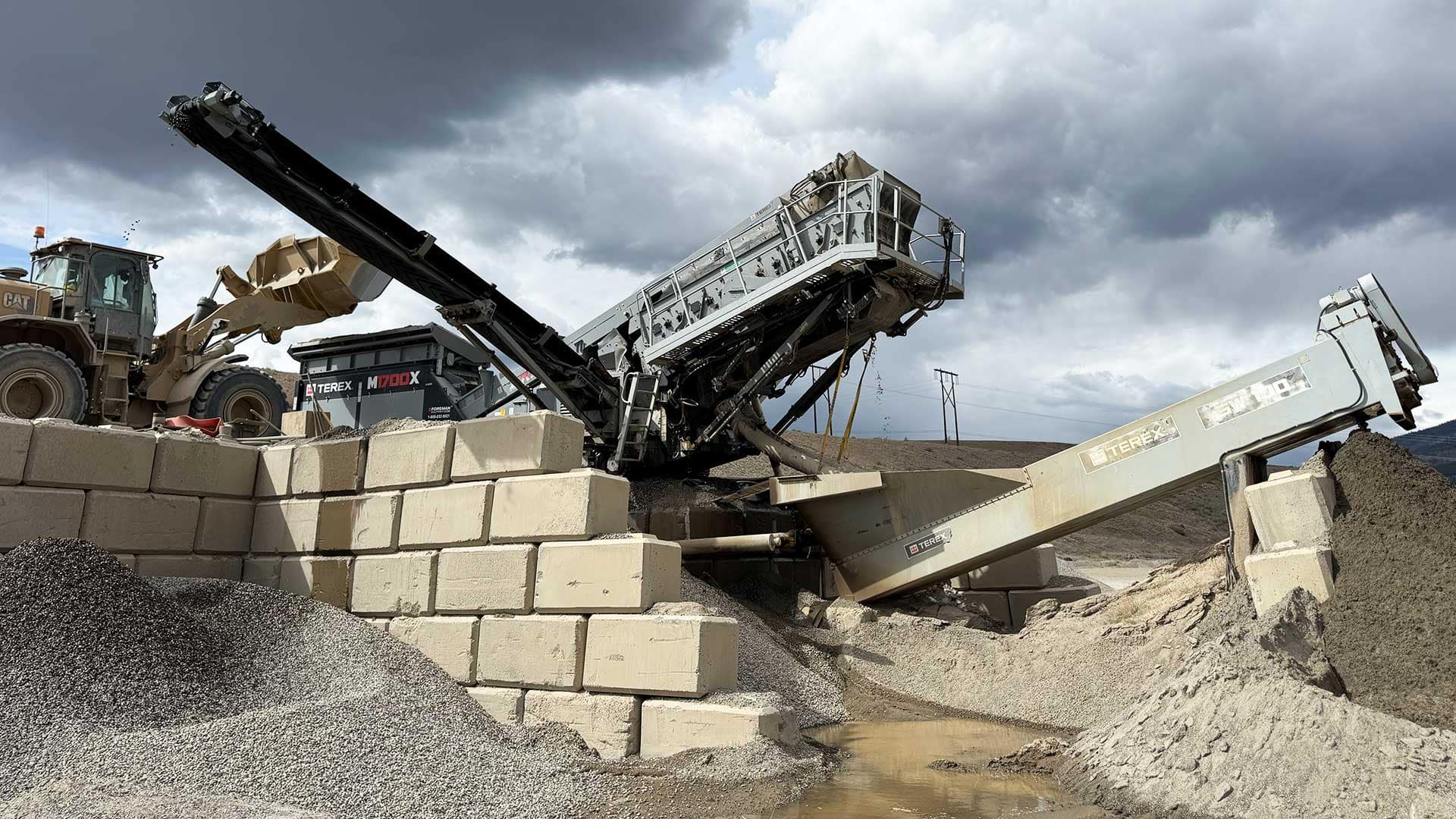Understanding Coarse and Fine Material Screw Washers: Why They Matter More Than You Think
Clean materials = Better Roads, Stronger Concrete, and Fewer Headaches.
Here’s how coarse and fine material screw washers help get you there.
If you’re in the aggregates or construction game, you already know the end product is only as good as the raw materials going into it. But here’s a question we still hear way too often:
“Do I really need to wash my sand and gravel?”
Short answer? Yes. And we’ll explain why, without putting you to sleep.
Dirty Aggregates Cause Real Problems
Dirty Aggregates = Real Problems
Contaminants weaken mix strength
Reduced Durability
Moisture + clay = faster breakdown
Costly Callbacks
Poor quality = more rework & repairs
It might seem harmless, but clay, silt, shale, wood bits, and even organic junk like roots and twigs can wreak havoc on construction materials. These impurities weaken concrete and asphalt mixes and reduce the longevity of everything from sidewalks to skyscrapers.
That’s where aggregate washing comes in, especially coarse and fine material screw washers. These aren’t luxury items, they’re essential tools for producers who want to hit spec, boost performance, and cut down on costly rework.
Coarse and Fine Material Screw Washers
Coarse and fine material screw washers offer an effective solution for washing and classifying sand and gravel. By using screw washers, companies can achieve higher quality output, reduce operational costs, and minimize environmental impact.
In aggregate processing, “sizing” refers to screening rock and gravel over 3/8″, while “classifying” sorts finer materials like sand using water-based methods.
Big Rocks? Call in the Coarse Material Washer
Coarse material screw washers are the heavy lifters of the wash plant. They handle the bigger stuff, that is 3/8″ (10mm) up to 4″ (100mm) and clean it using a combination of paddles, water, and agitation.
They are ideal for materials like crushed stone, gravel, and coarse sand. Think of it like a washing machine for your gravel. Dirt, light clay, and crusher dust get scrubbed off so your larger aggregates don’t carry contaminants into your final product.
They work by tumbling and agitating the material in water, which helps to remove clay, silt, and other contaminants. The screw mechanism then dewaters the material, leaving clean, coarse aggregates ready for use.
When to Use a Coarse Washer:
- You’re dealing with crushed rock or gravel ranging in size from 10mm (3/8″) to 100mm (4″).
- There’s light clay or crusher dust that screening alone won’t remove.
- You want a straightforward, low-maintenance system to clean up your feed.
Advantages of Using Coarse Material Screw Washers
- Effective Cleaning: They efficiently remove soluble clays and dust coatings from aggregate surfaces.
- De-watering Capability: Helps in reducing the moisture content of the processed aggregates, making them ready for use faster.
- Adjustable Weir System: Allows for customization of the cleaning process based on the aggregate type and the level of contamination.
Heads Up:
Coarse material screw washers are limited to coarse material and aren’t suitable for fine particles which the process can wash out and lose altogether. They are great for light contaminants, but they’re not designed to remove sticky plastic clays or vegetation.
If you’ve got roots and muck, you might need something with a bit more muscle, like a log washer.
Pro’s and Con’s of Coarse and Fine Material Screw Washers
Advantages
Effective clay removal
Easy to operate
Good for large material
Disadvantages
Can’t handle sticky plastic clay
Won’t fully remove vegetation
Tiny Grains, Big Deal: Enter Fine Material Washing
Now, let’s zoom in.
Fine material screw washers are built to handle sand and fines, typically from 3/8″ (10mm) down to 200 mesh (about 75 microns). They don’t just clean—they classify and dewater too, making sure your sand is clean, spec’d, and ready to go.
Quick Tip:
Minus 200 mesh” means the particles are super fine—we’re talking smaller than flour. These fines can mess with your mix if they’re not managed properly.
Why You’d Use a Fine Washer:
- You want to remove clay, silt, and superfine particles.
- You need to get your moisture content down for easier handling and transport.
- You want tight control over sand gradation for specific mix designs.
Advantages of Fine Material Screw Washers:
- Fine Cleaning: Excellent at removing silt, clay, and other fine particles from sand and other fine aggregates.
- Dewatering Capability: Helps in reducing moisture content in the final product, making it easier to handle and transport.
- Improved Material Quality: Enhances the quality of the final product by removing fine contaminants.
Things to Consider:
Fine washers require more maintenance (those tiny particles love to clog things), and they aren’t designed to handle larger material. But when it comes to precision washing, they’re tough to beat.
Pro: Why Use a Fine Material Screw Washer
| Removes Fines | Eliminates silt, clay, and ultra-fine particles (down to 200 mesh). |
| Dewatering Built-In | Helps reduce moisture for easier handling and transport. |
| Grading Precision | Classifies by size/density for consistent, spec-ready product. |
| Compact Footprint | Space-saving design ideal for tight sites or mobile operations. |
| Water Efficient | Uses less water than some alternatives like cyclones. |
Cons: What to Watch Out For
| Limited Size Range | Only works with material under 3/8” – can’t handle rock. |
| More Maintenance | Slurry and buildup require regular cleaning and care. |
| Dewatering Limits | Not as efficient as dedicated dewatering screens or cyclones. |
| Lower Throughput | Slower than other systems for high-volume needs. |
| Struggles with Sticky Clays | Not ideal for tough, plastic clays or organics. |
Bonus: Mesh Size Explained
Let’s clear this up, plain and simple:
 100 mesh = 100 holes per inch.
100 mesh = 100 holes per inch. - 200 mesh = 200 holes per inch
The higher the number, the smaller the particles that can pass through.
So, “minus 200 mesh” sand is finer than minus 100 mesh, and both need to be removed if you’re after clean, spec-compliant aggregates.
The Water Angle: Waste Less, Wash More
The best part? Modern washing systems don’t just clean better, they also help conserve water.
At Foreman, we’ve seen major gains with closed-loop water recycling systems and high-efficiency dewatering equipment. Some systems recover up to 90% of process water, cutting down on both water usage and pond maintenance.
Less mud. Less water waste. Fewer environmental headaches.
Here’s the Bottom Line
Whether you’re crushing rock, screening sand, or managing recycled materials, if your feedstock’s dirty, you’re losing value. Clean aggregates don’t just meet spec. They increase durability, improve performance, and keep customers happy.


 100 mesh = 100 holes per inch.
100 mesh = 100 holes per inch.